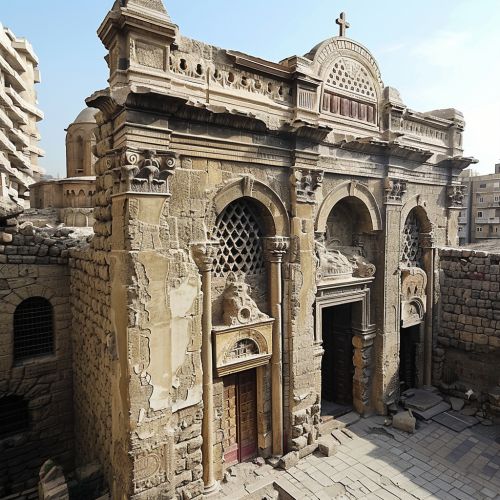John Mark: Difference between revisions
(Created page with "== Early Life and Background == John Mark, often referred to simply as Mark, is a significant figure in early Christian history. He is traditionally identified as the author of the Gospel According to Mark, one of the four canonical gospels in the New Testament. Mark is believed to have been born in the early 1st century AD, likely in Jerusalem. His family was of Jewish origin, and they were early converts to Christianity. His mother,...") |
No edit summary |
||
| Line 24: | Line 24: | ||
* [[Church of Alexandria]] | * [[Church of Alexandria]] | ||
[[Image:Detail-96063.jpg|thumb|center|An ancient church in Alexandria, Egypt, with intricate architectural details and historical significance.]] | |||
== References == | == References == | ||
Revision as of 03:38, 4 July 2024
Early Life and Background
John Mark, often referred to simply as Mark, is a significant figure in early Christian history. He is traditionally identified as the author of the Gospel According to Mark, one of the four canonical gospels in the New Testament. Mark is believed to have been born in the early 1st century AD, likely in Jerusalem. His family was of Jewish origin, and they were early converts to Christianity. His mother, Mary, owned a house in Jerusalem that served as a meeting place for the early Christian community, as mentioned in the Acts of the Apostles.
Association with Apostles
John Mark's association with prominent apostles is well-documented. He was a cousin of Barnabas, an early Christian missionary. This familial connection likely facilitated his introduction to the early Christian movement. Mark accompanied Barnabas and Paul on their first missionary journey, as recorded in the Acts of the Apostles. However, he left them prematurely in Pamphylia, which led to a temporary estrangement between him and Paul.
Role in Early Christian Missions
Despite the initial fallout with Paul, John Mark continued to play a pivotal role in the spread of Christianity. He later reconciled with Paul, as evidenced by Paul's references to him in his epistles. Mark is mentioned in the Epistle to the Colossians and the Second Epistle to Timothy, where Paul speaks of him in a positive light. Additionally, Mark is believed to have worked closely with the Apostle Peter, serving as his interpreter and scribe. This close association with Peter is significant, as it is thought to have influenced the content and perspective of the Gospel of Mark.
The Gospel of Mark
The Gospel of Mark is the second book of the New Testament and is considered one of the Synoptic Gospels, along with Matthew and Luke. It is widely regarded as the earliest of the four gospels, written around 70 AD. The gospel is characterized by its succinct and action-oriented narrative, focusing on the deeds and miracles of Jesus Christ. Unlike the other gospels, Mark's account does not include a genealogy or a detailed birth narrative of Jesus. Instead, it begins with the ministry of John the Baptist and the baptism of Jesus.
The Gospel of Mark is notable for its emphasis on the Messianic Secret, a theme where Jesus is portrayed as instructing his disciples to keep his identity as the Messiah confidential. This gospel also highlights the suffering and humanity of Jesus, culminating in his crucifixion and resurrection. The abrupt ending of the Gospel of Mark, with the women fleeing the empty tomb in fear, has been a subject of scholarly debate and has led to the hypothesis of a lost ending or later additions.
Later Life and Legacy
Little is known about the later life of John Mark. Tradition holds that he founded the Church of Alexandria, one of the most important centers of early Christianity. Mark is venerated as the patron saint of Venice, and his symbol, the winged lion, is prominently featured in Venetian iconography. His relics are believed to be housed in St. Mark's Basilica in Venice, a testament to his enduring legacy in Christian history.
See Also

